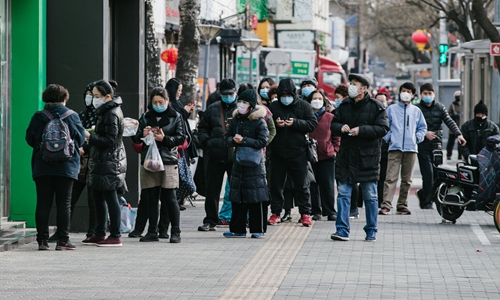HOME >> CHINA
Residents asked to recite official notices if found walking outside
By Liu Caiyu Source:Global Times Published: 2020/2/19 19:53:40

Beijing Xicheng district residents are seen queuing up to buy disposable masks by showing their ID cards at nearby pharmacies on Tuesday. Xicheng district reported 47 confirmed cases of COVID-19 infection as of Monday. Photo: Li Hao/GT
Residents of cities in Central China's Hubei Province will have to learn and recite government official documents if they are found walking on the roads amid the fight against the novel coronavirus outbreak, with grassroots officials explaining that some residents who lack protection awareness may pose a danger to other people.
Several regions, including Xishui county and Wuxue city, have ordered residents to stay indoors and reduce the frequency of going out amid the epidemic, and if they are found on streets without having a good reason, they will be sent to a designated place to learn and recite the relevant government documents, reports said.
"I have acknowledged that my behavior violates government orders," a man who broke the document order said after the compulsory study session in a gym in Xishui county, according to an online video. Another said, "My behavior brought the possibility of cross infection for me and my family."
Accompanied by police officers, several residents wearing masks sat in a gym ready to read the government documents. Violators were asked to read a large admonishing document printed on a board one by one, the video showed.
Starting from Monday, the public security department of Xishui county intensified its patrol and control efforts, carrying out strict inspections of urban roads to ensure that the circular issued by the government was strictly implemented.
Wuxue, another city in Hubei, also adopted a similar measure asking people to stay indoors. "All residents who do not have epidemic prevention tasks and go out into the streets (except those who seek medical treatment) shall be sent to the gym for compulsory study."
Netizens hailed the measure, with many saying it would be better if the government had taken this measure in the early stages of epidemic prevention. But some also said it was an overreaction, and that gathering residents in the gym may increase the chance of being infected.
The chance of human-to-human infection of the novel coronavirus clearly does not concern all residents. There are residents who lack self-protection consciousness and their actions pose a danger to others in the community, a grassroots official in Hebei, North China's Hebei Province, told the Global Times on condition of anonymity.
"It puts us into a dilemma when sometimes you come across someone really unreasonable," he said.
As China battles against the novel coronavirus outbreak, certain incidents by grassroots workers and officials in epidemic prevention and control work have also been strongly criticized by netizens online recently as "excessive", with some leading to accusations of abuse of power.
Many pointed to a circular issued by a community in Xianning, which warned couples to sleep in separate beds, calling it an overreaction. The circular said family members also have to wear masks at home and eat and sleep separately.
"The circular is not compulsory but only a kind warning to those family members who have light symptoms of cough or fever. The suggestion is for residents to better protect themselves, even at home," Yu Xia, the Party secretary of the community, explained to the Global Times.
One video featuring a police officer parading nine people on a street and ordering them to repeat epidemic prevention and control regulations after they were found playing cards together also triggered widespread controversy, media reported.
A worker from Henan Province was discovered tying up a villager who refused to wear a mask to a pillar, and several workers from Xiaochang reportedly slapped people for playing mahjong.
Zhu Lijia, a professor of public management at the Chinese Academy of Governance, called for grassroots strengthening of legal knowledge. "Grassroots workers need to enforce their power in accordance with the law and know how to deal with cases of uncooperative residents," Zhu told the Global Times.
Posted in: SOCIETY,CHINA FOCUS